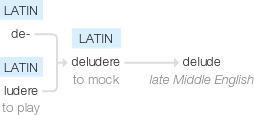Delude
late Middle English: from Latin deludere ‘to mock’, from de- (with pejorative force) + ludere ‘to play’.
wiktionary
From Middle English deluden, from Latin dēlūdō(“mock, deceive”), from de + lūdō ("I make sport of, I mock"). See ludicrous.
etymonline
delude (v.)
"deceive, impose upon, mislead the mind or judgment of," c. 1400, from Latin deludere "to play false; to mock, deceive," from de- "down, to one's detriment" (see de-) + ludere "to play" (see ludicrous). Related: Deluded; deluding.
Mislead means to lead wrong, whether with or without design. Delude always, at least figuratively, implies intention to deceive, and that means are used for that purpose. We may be misled through ignorance and in good faith, but we are deluded by false representations. A person may delude himself. [Century Dictionary]
